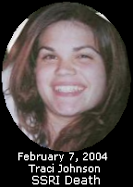http://www.socialaudit.org.uk/_disc//messages/23/78.html?SundayAugust1420051135pm#POST3480
(This address is unavailable)
Scared in MN -
Okay, advice and success stories we can help with. Get a nice hot cuppa, and put your feet up. Firstly, I've got to make it clear that I'm from the UK, and I'm guessing that MN is USA (?), if so, be aware that our national health systems are very, very different, and make allowances for this.
Right, where do we start...
1. Success stories - at one point I was on celexa, and tried to stop very much like you did. Result = total disaster. Yet I am now completely off them. Success stories are everywhere, and they proliferate once people realise what is actually going on when they tackle withdrawal i.e. they arm themselves with information about it (like you are currently doing), and then withdraw in accordance with what they have learnt, comforted with the knowledge and understanding that allows each potential withdrawal problem to be studied and recognised for what it is.
2. 'Scared to death and don't know what to do' - with regard to these drugs (you are on a SSRI, like prozac), ignorance is not bliss. Start learning & reading, the knowledge is going to knock a lot of the fear out of the window.
3. Your First Withdrawl Attempt - well, as you now realise, cold turkey can be a horrendous experience. It's not surprising you were forced straight back onto the drug. That's commonplace. Don't worry about it. Just let yourself stabilise for a bit, and get over the shock of what's happened.
4. Your doctor's response - well, she is correct in that some people may not be able to withdraw from the drug. It is being slowly acknowledged that some individuals will not be able to successfully withdraw, because of the physiological addiction: BUT that is a reasonable statement ONLY if you had been given thorough withdrawal advice, detailed withdrawal protocols, and constant support throughout the whole process! So I think you can safely throw that conclusion out of the window.
5. You want to get off the drugs - a difficult one, this one. Most people decide to come off the drugs because of a) adverse effects or b) feeling better or c) drugs doing nothing. The reason behind the decision to quit needs to be carefully considered. Faith is an extra level of strength, that will help you through withdrawal; but you do need to have a very clear idea of why you are coming off. This is one that only you, +/- a doctor, can sort out, with particular regard to the reason you were prescribed the drug to begin with...
6. A Doctor to help you through the process - can't help on that one. All I can suggest is to ask around. It seems that most doctors are still woefully uninformed about all aspects of these drugs, and are wading about often dispensing less than adequate, and occasionally dangerous, advice. If you find a well-informed doctor, you are on a winner.
7. Hints on how to get off :- Go straight to your local library or bookshop and get a copy of Joseph Glenmullen's 'The Antidepressant Solution - A step by step guide to safely overcoming anti-depressant withdrawal, dependence and addiction'. Or order it on the web (e.g. at www.amazon.com). It's a straightforward 'how to', telling you pretty much everything you need to know. It's just been published, and I wish I'd had a copy a few years ago. The basics are: a) tells you about the withdrawal symptoms, b) how to withdraw from the dose you are currently on, c) what signs to be aware of e.g. coming off too fast, or dropping your dose too quickly, d) draw up a workable timetable that'll get you through it. It's a good common-sense compilation. Read it - from the first page to the last, and don't start your withdrawal until you have done so... Always remember that your system is now attuned physiologically to the celexa, so you have to give it a nice... slow... taper... as you withdraw, giving your body gentle changes to which it can adapt, and mild/no withdrawal symptoms at each stage (better for you and your children); rather than a massive shock - and you already know the results of that. Some people move relatively swiftly and unproblematically through withdrawal, some have to taper their dose reductions more slowly, and a very small number have to reduce in tiny increments over long time periods. I can't say which group you will fall into, but the IMPORTANT thing is that even if you are extemely unlucky and need a very long taper, you are overwhelmingly likely to be able to successfully withdraw.
Other things - read the March 7th 2005 post, above, here's another success story. In the post below that, is a link to a highly reputable withdrawal protocol, print this off and study it -until the Glenmullen book arrives, since this, naturally, has much more detail - you should see all your withdrawal symptoms listed in the document, and it will reassure you as to what happened when you went 'cold turkey'. Go web surfing, for other independent withdrawal advice; and over at Yahoo is a 'Withdrawal and Recovery' Group for people in your very situation, if you feel like it, drop in and say hello. Search the other posts on this site using the facility at the bottom of the page... Celexa = cipramil = citalopram... lots of info floating about.
Best wishes.
By Anon on Friday, July 15, 2005 - 01:18 am:
1 week ago
















No comments:
Post a Comment